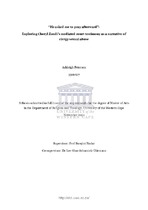| dc.contributor.advisor | Nadar, Sarojini | |
| dc.contributor.author | Petersen, Ashleigh | |
| dc.date.accessioned | 2022-02-28T08:54:31Z | |
| dc.date.available | 2022-02-28T08:54:31Z | |
| dc.date.issued | 2021 | |
| dc.identifier.uri | http://hdl.handle.net/11394/8747 | |
| dc.description | Magister Theologiae - MTh | en_US |
| dc.description.abstract | South Africa has one of the highest rape statistics in the world, and there are increasing reports of women who have been violated and abused in religious institutions, specifically by clergy. Research on clergy sexual abuse has been limited to research methods that rely on court transcripts or interviews and focus group discussions. Studies that seek to understand social and religious attitudes about sexual abuse often rely on surveys and other conventional forms of research. Drawing on the court testimony of Cheryl Zondi, who was sexually abused by her pastor, Timothy Omotoso, this study aimed to explore how social media provides a site for exploring the ways in which patriarchal religious understandings of gender and power are supported or challenged through a narrative of sexual abuse. | en_US |
| dc.language.iso | en | en_US |
| dc.publisher | University of Western Cape | en_US |
| dc.subject | Sexual abuse | en_US |
| dc.subject | Religion | en_US |
| dc.subject | Social media | en_US |
| dc.subject | Gender | en_US |
| dc.subject | YouTube | en_US |
| dc.title | “He asked me to pray afterward”: Exploring Cheryl Zondi’s mediated court testimony as a narrative of clergy sexual abuse | en_US |
| dc.rights.holder | University of Western Cape | en_US |

